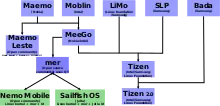Tizen
Tizen (/ˈtaɪzɛn/) is a Linux-based mobile operating system backed by the Linux Foundation, mainly developed and used primarily by Samsung Electronics.
 | |
| Developer | Linux Foundation, Samsung Electronics |
|---|---|
| Written in | HTML5, C, C++ |
| OS family | Linux (Unix-like) |
| Working state | Current |
| Source model | Open source with source available and proprietary components |
| Initial release | January 5, 2012 |
| Latest release | 7.0 M1 / May 31, 2022[1] |
| Repository | |
| Marketing target | Smartwatch, embedded systems, smartphones, |
| Package manager | RPM Package Manager |
| Platforms | ARM, ARM64, x86, and x86-64 |
| Kernel type | Monolithic (Linux) |
| Userland | GNU |
| Default user interface | Graphical (native and web applications), One UI for Smartwatch, TouchWiz for Smartphone |
| License |
|
| Official website | tizen |
The project was originally conceived as an HTML5-based platform for mobile devices to succeed MeeGo. Samsung merged its previous Linux-based OS effort, Bada, into Tizen, and has since used it primarily on platforms such as wearable devices and smart TVs.
Much of Tizen is open source software, although the software development kit contains proprietary components owned by Samsung, and portions of the OS are licensed under the Flora License, a derivative of the Apache License 2.0 that grants a patent license only to "Tizen certified platforms".
In May 2021, Google announced that Samsung would partner with the company on integrating Tizen features with its Android-derived Wear OS, and committed to use it on future wearables, leaving Tizen to be mainly developed for Samsung Smart TV.
History

The project was initiated as mobile Linux and was launched by Intel in July 2007, in April 2009 the operating system had managed to updated to version 2.0 which the core was based on Fedora. However, on the same month, Intel turned Moblin over to the Linux Foundation for future development. Eventually, the operating system was merged with Nokia Maemo, a Debian based Linux distro, into MeeGo which mainly developed by Nokia, Intel and Linux Foundation.
In 2011, after Nokia abandoned the project, Linux Foundation initiate the Tizen project as a successor to MeeGo, another Linux-based mobile operating system, with its main backer Intel joining Samsung Electronics, as well as Access Co., NEC Casio, NTT DoCoMo, Panasonic Mobile, SK Telecom, Telefónica, and Vodafone as commercial partners. Tizen would be designed to use HTML5 apps, and target mobile and embedded platforms such as netbooks, smartphones, tablets, smart TVs, and in-car entertainment systems.[2] U.S. carrier Sprint Corporation (which was a backer of MeeGo) joined the Tizen Association in May 2012.[3] On September 16, 2012, Automotive Grade Linux announced its intent to use Tizen as the basis of its reference distribution.[4]
In January 2013, Samsung announced its intent to release multiple Tizen-based phones that year. In February 2013, Samsung merged its Bada operating system into Tizen.[5][6]
In October 2013, the first Tizen tablet was shipped by Systena. The tablet was part of a development kit exclusive to Japan.[7][8][9]
In 2014, Samsung released the Gear 2 smartwatch that used a Tizen-based operating system as opposed to Android.[10]
On May 14, 2014, it was announced that Tizen would ship with Qt.[11] This project was abandoned in January 2017.[12]
On February 21, 2016, Samsung announced the Samsung Connect Auto, a connected car solution offering diagnostic, Wi-Fi, and other car-connected services. The device plugs directly into the OBD-II port underneath the steering wheel.[13]
On November 16, 2016, Samsung said they would be collaborating with Microsoft to bring .NET Core support to Tizen.[14]
According to Strategy Analytics research, approximately 21% of the smart TVs sold in 2018 run on the Tizen platform making it the most popular smart TV platform.[15]
On May 19, 2021, during Google I/O, Google announced that Samsung had agreed to work on integrating features of Tizen with the next version of Wear OS, and that it had committed to using Wear OS for its future wearable products.[16][17][18] Samsung will continue to use Tizen for its smart TVs.[19]
On December 31, 2021, the Tizen app store permanently closed.[20] The last smartphone based on the Tizen operating system is the Samsung Z4 which was released in 2017. The company switched to Google's Wear OS 3 platform on its Galaxy Watch 4 smartwatches.[21][22]
Releases
- Tizen 1.0: April 30, 2012[23]
- Tizen 2.0: February 18, 2013[24]
- Tizen 2.1: May 18, 2013[25]
- Tizen 2.2: July 22, 2013[26]
- Tizen 2.2.1: November 9, 2013[27]
- Tizen 2.3: February 9, 2015[28]
- Tizen 2.4: October 30, 2015[31]
- Tizen 2.4 Rev1: December 1, 2015
- Tizen 2.4 Rev2: December 23, 2015
- Tizen 2.4 Rev3: February 5, 2016
- Tizen 2.4 Rev4: March 4, 2016
- Tizen 2.4 Rev5: April 4, 2016
- Tizen 2.4 Rev6: May 19, 2016
- Tizen 2.4 Rev7: June 30, 2016
- Tizen 2.4 Rev8: August 2, 2016
- Tizen 3.0: January 18, 2017
- Tizen 4.0: May 31, 2017
- Tizen 5.0: May 31, 2018
- Tizen 5.5: May 31, 2019
- Tizen 6.0: May 31, 2020
- Tizen 6.5: May 31, 2021
- Tizen 7.0: May 31, 2022
- Tizen 7.0 Public M1: May 31, 2022[50]
Compatible devices
Smartwatch
.jpg.webp)
- Samsung Galaxy Gear
- Samsung Gear S
- Samsung Gear S2
- Samsung Gear S3
- Samsung Gear 2
- Samsung Gear Fit 2
- Samsung Gear Fit 2 Pro
- Samsung Gear Sport
- Samsung Galaxy Watch
- Samsung Galaxy Watch Active
- Samsung Galaxy Watch Active 2
- Samsung Galaxy Watch 3
Camera

- Samsung NX200
- Samsung NX300
- Samsung NX1
Smartphone
- Samsung Z
- Samsung Z1
- Samsung Z2
- Samsung Z3
- Samsung Z4
Television
- Samsung Smart TVs since 2015[51]
Appliances
- Family Hub 3.0 Refrigerator[52]
LED Wall controllers
- SBB-SNOWJ3U[53]
Controversies
On April 3, 2017, Vice reported on its "Motherboard" website that Amihai Neiderman, an Israeli security expert, has found more than 40 zero-day vulnerabilities in Tizen's code, allowing hackers to remotely access a wide variety of current Samsung products running Tizen, such as Smart TVs and mobile phones.[54] After the article was published, Samsung, whom Neiderman tried to contact months before, reached out to him to inquire about his allegations.[54]
See also
- Comparison of mobile operating systems
- KaiOS
- Sailfish OS
References
- "Tizen 7.0 Public M1". docs.tizen.org/.
- Ricker, Thomas (2011-09-28). "MeeGo is dead: Resurrected as Tizen, the newest Linux-based open source OS". The Verge. Retrieved 2019-01-21.
- Robertson, Adi (2012-05-07). "Sprint becomes first North American carrier to join Tizen Association". The Verge. Retrieved 2019-01-21.
- Best, Jo. "Tizen Linux heads for vehicles as car makers and tech firms form workgroup". ZDNet. Retrieved 2019-01-21.
- Byford, Sam (2013-02-25). "Samsung finally folding Bada OS into Tizen". The Verge. Retrieved 2019-01-21.
- Souppouris, Aaron (2013-01-03). "Samsung confirms it will launch multiple Tizen handsets this year". The Verge. Retrieved 2019-01-21.
- Brown, Eric (June 27, 2013). "World's first Tizen tablet?". LinuxGizmos.com. Archived from the original on July 2, 2013. Retrieved February 23, 2014.
- Brown, Eric (25 October 2013). "First Tizen tablet ships to developers". LinuxGizmos.com. Archived from the original on October 28, 2013. Retrieved February 23, 2014.
- Buckley, Sean (October 25, 2013). "First Tizen tablet launches in Japan, caters exclusively to developers". Engadget. Archived from the original on January 25, 2014. Retrieved February 23, 2014.
- Savov, Vlad (2014-02-22). "Samsung drops Android for Tizen in new Gear 2 smartwatches". The Verge. Retrieved 2019-01-21.
- "Tizen:Common to Ship with Qt Integrated". tizenexperts.com. 14 May 2014.
- "Tizen - Qt Wiki". wiki.qt.io.
- "Samsung Ushers in a New Era of Driving Experience with Samsung Connect Auto". February 21, 2016. Retrieved March 10, 2018.
- "Samsung announces .NET Core support and Visual Studio Tools for Tizen OS". MSPoweruser. November 16, 2016.
- "Samsung's Tizen OS dominates global smart TV market". March 25, 2019. Retrieved August 23, 2019.
- Amadeo, Ron (2021-05-18). "Google, Samsung, and Fitbit team up to save Wear OS". Ars Technica. Retrieved 2021-05-19.
- "Google and Samsung team up to create a new OS named 'Wear'". SamNext. 2021-05-18. Retrieved 2021-05-19.
- Welch, Chris (2021-05-18). "Google and Samsung are merging Wear OS and Tizen". The Verge. Retrieved 2021-05-19.
- Adhikari, Sumit (2021-05-21). "Samsung TVs Will Continue To Use Tizen OS". Android Headlines. Retrieved 2021-06-15.
- Beguwala, Esmail. "Samsung shuts down Tizen app store". onlytech.com. Retrieved 2022-04-21.
- "Samsung shuts down the Tizen app store". GSMArena.com. Retrieved 2022-04-21.
- Jan 10, TIMESOFINDIA COM |; 2022; Ist, 11:25. "Samsung officially shuts down its Tizen app store - Times of India". The Times of India. Retrieved 2022-04-21.
{{cite web}}: CS1 maint: numeric names: authors list (link) - "Tizen 1.0 Release Notes". Tizen.org.
- "Tizen 2.0 Release Notes". Tizen.org.
- "Tizen 2.1 Release Notes". Tizen.org.
- "Tizen 2.2 Release Notes". Tizen.org.
- "Tizen 2.2.1 Release Notes". Tizen.org.
- "Tizen 2.3 Release Notes". Tizen.org.
- "Tizen 2.3.1 Release Notes". Tizen.org.
- "Tizen 2.3.2 Release Notes". Tizen.org.
- "Tizen 2.4 Release Notes". Tizen.org.
- "Tizen IVI 3.0 Milestones". Tizen.org.
- "Tizen Common milestones". Tizen.org.
- "Tizen 3.0 Milestones". Tizen.org.
- "Tizen 3.0 Public M2". Tizen.org.
- "Tizen 3.0 Public M3". Tizen.org.
- "Tizen 3.0 Public M4". Tizen.org.
- "Tizen 4.0 Public M1". Tizen.org.
- "Tizen 4.0 Public M2". Tizen.org.
- "Tizen 4.0 Public M3". Tizen.org.
- "Tizen 5.0 Public M1". Tizen.org.
- "Tizen 5.0 Public M2". Tizen.org.
- "Tizen 5.5 Public M1". Tizen.org.
- "Tizen 5.5 Public M2". Tizen.org.
- "Tizen 5.5 Public M3". Tizen.org.
- "Tizen 6.0 Public M1". Tizen.org.
- "Tizen 6.0 Public M2". Tizen.org.
- "Tizen 6.5 Public M1". Tizen.org.
- "Tizen 6.5 Public M2". Tizen.org.
- "Tizen 7.0 Public M1". Tizen.org.
- Silva, Robert (31 December 2020). "Samsung's Tizen Smart TV Operating System". lifewire.com. Retrieved 21 February 2022.
- "Side-by-Side Refrigerator with Family Hub (RS27T5561SR) | Samsung US". Samsung Electronics America. Retrieved 2020-06-25.
- "accessories | SBB-SNOWJ3U | Samsung Display Solutions". displaysolutions.samsung.com. Retrieved 2019-10-31.
- Zetter, Kim (April 3, 2017). "Samsung's Android Replacement Is a Hacker's Dream". Motherboard. Retrieved 2020-06-30.
External links
- Official website

- Comprehensive list of Tizen devices – detailed and incomplete list of devices that run Tizen